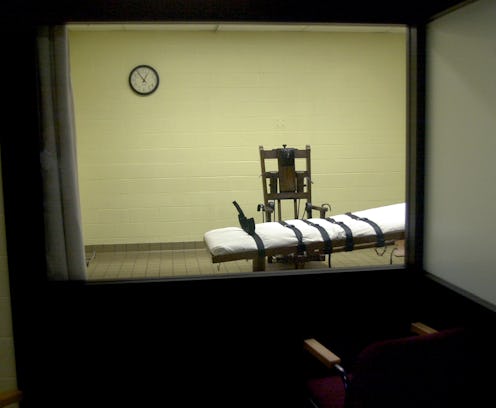News
Should Death Row Inmates Be Able To Donate Organs?
This Wednesday, child murderer Ronald Phillips is set to be put to death by the state of Ohio. He'll be a guinea pig for the state, which famously ran out of its standard execution drug, pentobarbital, last year, so is preparing to try out a brand-new cocktail on the 1993 murderer. But Phillips has a last-minute request: after the lethal injection stops his heart, he wants the state to donate his organs. This is unprecedented in America, but let's not forget: the number of donors in the U.S. is far eclipsed by the people who need them, and indeed die every day waiting for them.
In China, state press claims that a huge chunk of transplantable organs come from the country's death-row inmates, who are legally permitted to donate their organs after execution. Should America be doing the same?
When it comes to Phillips, the issue is even more tangled. Phillips has already tried to postpone his execution on the grounds that he doesn't want to be the state's test subject, but was denied. In his letter to Ohio's Department Of Corrections, he begs for organ donation on the grounds that his mother and sister have failing organs. His request is so late in the game that it seems unlikely that this is anything other than a last-ditch attempt to delay his execution. At any rate, Phillips' body will need to be examined at length to study the effects of this brand-new form of lethal injection, making him virtually ineligible for organ donation.
But what of the next inmate to request the same thing? And the next, and the next? If these inmates are to die anyway, isn't it pragmatic to consider respecting their wishes, and save the lives of decent, ordinary citizens to boot?
Let's look at China. The country's state media, China Daily, reports that 65 percent of transplantable organs come from deceased death-row inmates. It's an appealing argument: Just one donor can save up to eight lives, and there are more than 100,000 Americans currently on the wait-list for an organ. Each day, 18 of those people die. If the system has been successful in China, what's to say it wouldn't work here?
Well, the objections to the question are largely ethical. For a start, America doesn't compromise when it comes to organ donation: the States' "opt-in" program, for example, refuses to allow organ donation unless the donor has specifically recorded their consent. Even though it's long been estimated that the implementation of an "opt-out" program — under which you'd be viable for donation unless you expressly withdrew your consent — would save hundreds, even thousands, of lives a year.
Still, policymakers feel that would take away a certain degree of liberty: your organs would be eligible for harvest and insertion into another person's body, and all without a word of consent from you. Some European countries have put pragmatism ahead of these concerns and implemented an "opt-out" program, but America, ideologically, tends to prize freedoms like these above all else.
But maybe consent isn't the issue here. Death-row inmates would theoretically sign up for donation, and, it could be argued, would have a better idea than most what they're signing up for. But these prisoners are, by and large, murderers: only particularly awful crimes, like the murder of a child or police officer, lands a criminal on death row.
Phillips, for example, was convicted of raping and murdering his girlfriend's three-year-old daughter. Some people are adamant that the idea of murderers' organs living on in ordinary people's bodies is grotesque. This may not be a pragmatic argument, but is an effective one: Imagine receiving a donor heart, and then discovering that it had powered a triple homicide.
There are plenty of other concerns: Could we develop into a society in which organs are viewed as more important than the people who house them? What would that lead to? If an inmate is given a more lenient sentence and agrees to become a donor, as legislators have suggested, would this undermine the justice system? Not to mention, inmates are more likely to have infectious diseases, like hepatitis and H.I.V., and so may be less eligible for donation than the general population.
The details of preparing a body for transplant would also compromise the entire execution process: the U.S. would have to come up with a new set of rules and drugs for execution, for example. Additionally, the flow of oxygen would have to be maintained after death for the transplants would be viable, meaning that the inmate wouldn't, technically, die instantly. This would compromise the nature of a legal execution.
Chances are, Phillips' request will be denied. Chances are, Phillips will be put to death Wednesday. But chances are, 18 people will also die waiting for a transplant tomorrow.
You can sign up to become an organ donor here.
